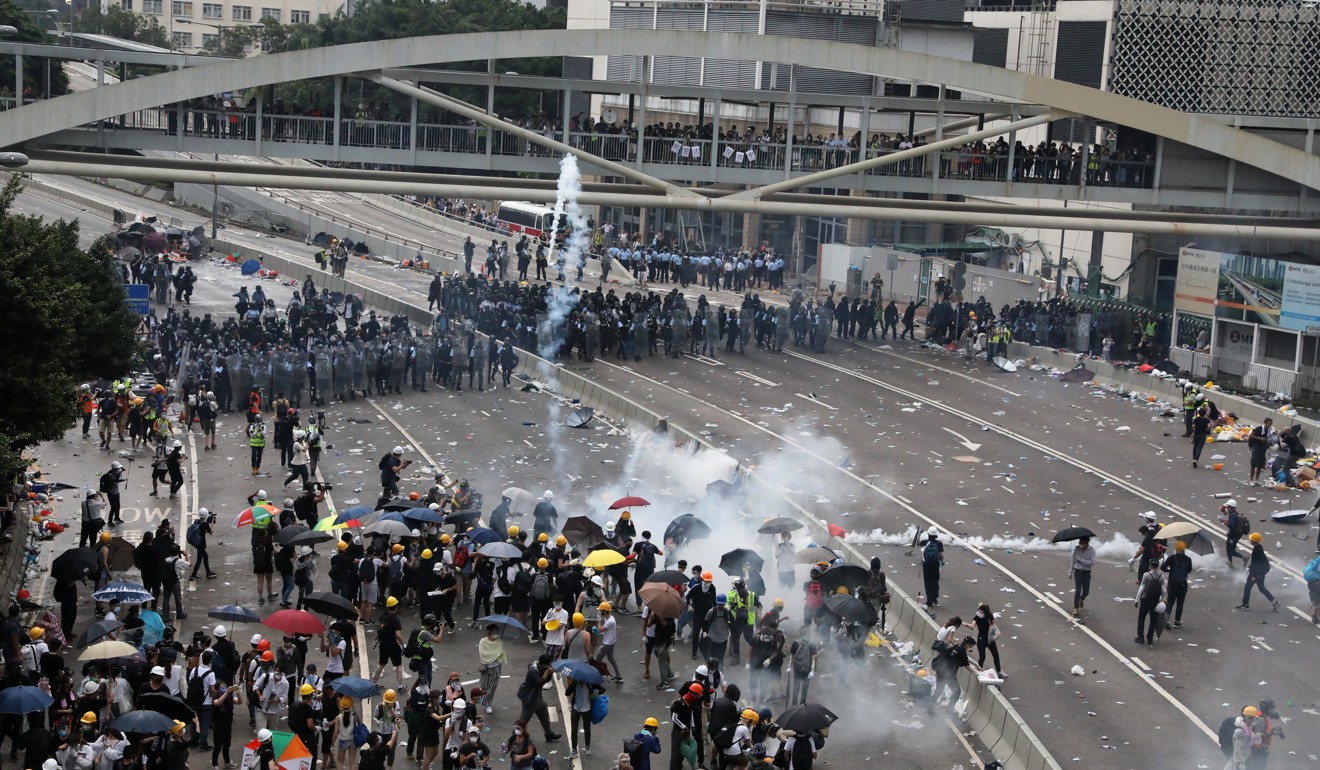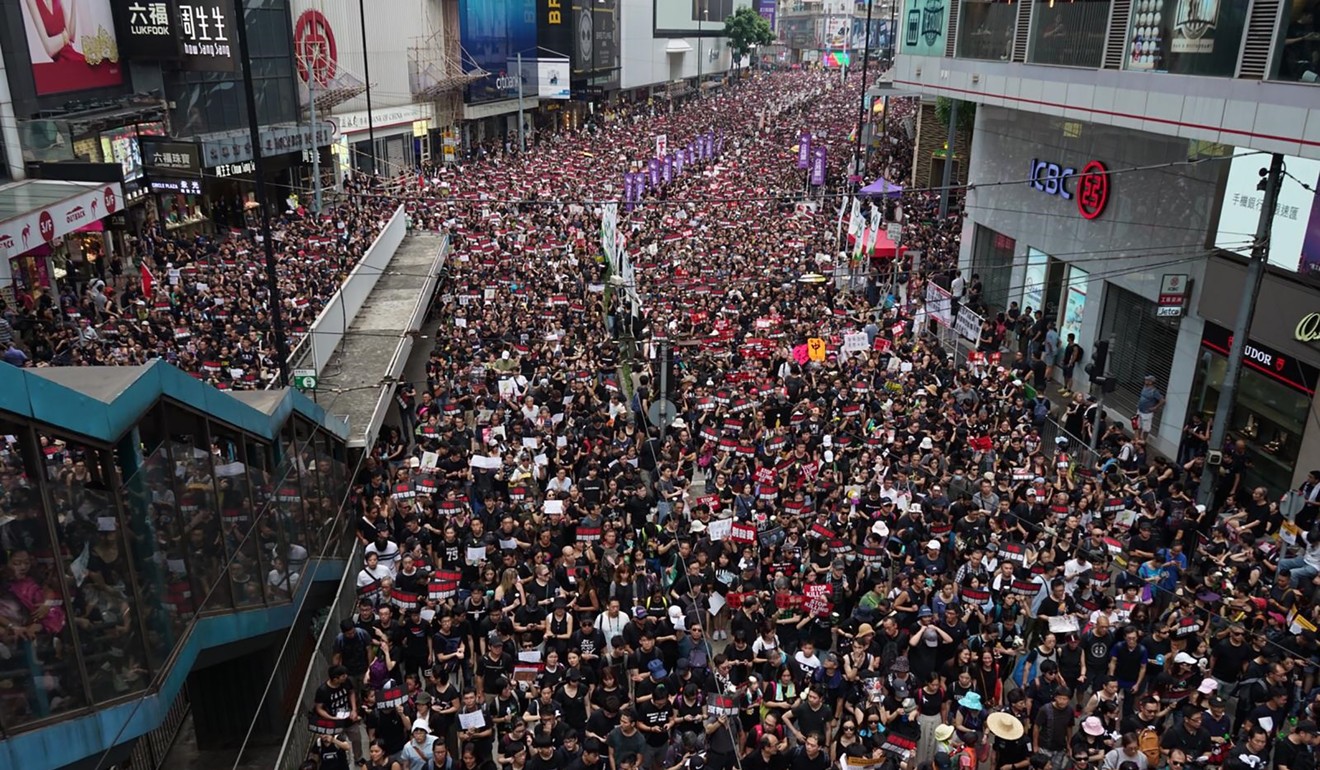Hong Kong extradition bill: this is no Singapore living in fear, this is a city ripping itself apart
- Thoughtful Singaporeans are deeply saddened that Hong Kong’s social fabric has been torn asunder through cynical and calculated social and political agitation, writes Leslie Fong

A picture circulating on social media of a young man who was protesting against Hong Kong’s bid to amend its extradition law, holding a placard that says “Don’t let Hong Kong be like Singapore where people live in fear”, has raised quite a few eyebrows in the island nation.
Many Singaporeans take umbrage at the words in the placard – though equally, there must be some who agree, to varying degrees, with this indictment of our country and society. I would argue that the latter are a minority. I am told the young man is a Singaporean and self-styled dissident whose antics are not found amusing by most of his compatriots. But no matter.
He is plainly misguided, misinformed and mischievous, but what he did brings to mind a phrase which an Englishwoman, Evelyn Beatrice Hall, writing under the pseudonym S.G. Tallentyre, used in her book The Friends of Voltaire: “I disapprove of what you say, but I will defend to the death your right to say it.” That was meant as an illustration of the French philosopher’s beliefs, but is often misattributed to Voltaire himself to make the case for freedom of speech.
I accept that the demonstrator is entitled to his opinion. But friends of mine who are less forgiving of this uncalled-for aspersion against Singapore have suggested in retort that he ought to check just how many ordinary Hong Kong folks would choose to live in Singapore if given the chance. That is an interesting question.
The more pertinent one, though, is how many Singaporeans would want to live in so divided and strife-riven a place as today’s Hong Kong. I say this not to disparage Hong Kong, which I have been visiting regularly for the past 40 years or more, and which has grown on me, but as a mark of profound sorrow at the sad spectacle of a city smothering itself in full global view. Egged on by some Western media, I might add.
The latest street violence has driven home the absurdity of it all to many thoughtful Singaporeans who have followed Hong Kong’s fortunes since 1997 – put bluntly, it was a triumph of unreason over good sense. We are deeply, deeply saddened that the city’s social fabric has been torn asunder through cynical and calculated social and political agitation planned and fanned by forces within and outside Hong Kong.
Singaporeans like me who wish Hong Kong well but who are, after all, outsiders, cannot do a thing about the debacle and shouldn’t even try. We can only watch in bewilderment – and reflect on the lessons we, and perhaps our Hong Kong friends, can learn from this unhappy saga.
The first is that it is not enough in politics and governance to have truth and facts on your side. Any fair-minded person who has looked at all the available facts about the extradition bill cannot but wonder why there is so much needless controversy over its proposed enactment.
The case for amending the Fugitive Offenders Ordinance is straightforward. Hong Kong has a duty to its citizens and the international community to put in place legislation that will remove the stigma of its being a haven for fugitives.
Those who wish to have a good grasp of all the salient points relating to the Hong Kong government’s moral and legal obligations to table the bill before the Legislative Council for eventual enactment, as well as the safeguards put in place, should read the speech made by former Hong Kong director of public prosecutions Grenville Cross, now an honorary professor of law at the University of Hong Kong, at a recent public forum. It is freely available on the internet.
They should also read the statement made by Hong Kong’s Chief Executive Carrie Lam, a day after the huge protest march on June 9, pledging the inclusion of more safeguards to prevent the legislation from being used as a tool of political repression by Beijing and a direct assault against the freedoms enjoyed by people living in Hong Kong.
In sum, the facts do not support the deliberate scaremongering about how the proposed law will facilitate the extradition of people whom Beijing wants to persecute for political reasons. Those who have chosen to disseminate distortions and falsehoods should look deep into their soul and reflect on the damage they are doing to Hong Kong society.

The second lesson is that even if a government is right to want to enact a particular law or proceed with a particular policy, and is acting in the best public interest, success or failure depends on how the process of getting that through is managed. Here the Hong Kong government has said openly that it could have done better.
The consensus among informed observers who have no political axe to grind is that the Hong Kong government has misjudged public sentiment and fallen short in explaining its case and persuading the bulk of the citizenry. Granted that there are sections of the Hong Kong public for whom anything that involves China (except the water they drink, the electricity they use and the food they eat) is automatically suspect, if not sinister, there is still a lot of middle ground to be won over. Alas, that did not happen.
Integral to successful management of the process is the need for adequate time and resources in preparation. Herein lies the third lesson. If the Hong Kong government was prepared to spend more than a year on public consultation over the development of an area in Kowloon into a cultural district, then there is no reason not to ensure adequate preparation for something a lot more politically contentious than that.
In this regard, the Singapore government has rarely been found wanting. For example, it spent years preparing the population for the national health care scheme called Medisave. Still, a reminder cannot hurt.

Last, but not least, the fourth lesson: the street violence in Hong Kong points to a government’s need to have in place the necessary legislative and coercive powers as well as the trained personnel to prevent and eliminate threats against public security.
By and large, thoughtful Singaporeans, even those with liberal leanings in many areas, have accepted, on balance, the existence of laws that empower preventive detention of those out to foment violence and undermine public security. What happened in Hong Kong should serve to remind them that they are not wrong in accepting detention without trial in exceptional cases in exchange for public security and social cohesion.
Is this trade-off something that Hong Kong people will countenance? Having seen protesters wearing helmets, goggles, full face masks and improvised body armour charge police lines with metal poles, some sharpened, and throw bricks, they must ask themselves whether they are happy to continue to live with such expressions of political protest and dissent – or whether it is not better to have preventive action to remove such rioters (I call a spade a spade) from the ranks of otherwise peaceful and law-abiding demonstrators.
Further, they might want also to reflect on whether there ought not be some measures to be taken to prevent politicians and activists with an agenda from fanning the flames of public disturbance.
These are, of course, choices for Hong Kong citizens to make. As someone who loves Hong Kong, I can only say it pains me to watch a Hong Kong in self-flagellation.
Leslie Fong is a former editor of Singapore’s The Straits Times